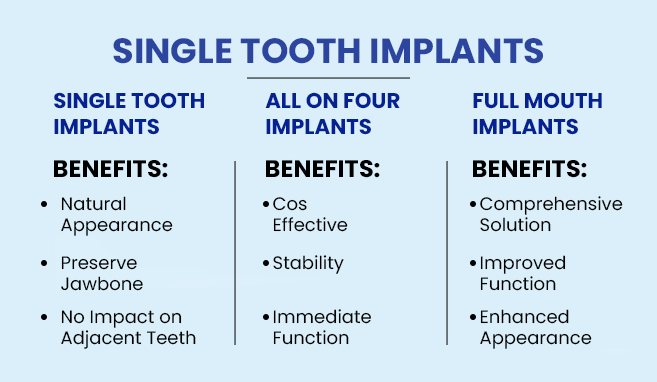Dental Implants: All on Four, Single Tooth, Full Mouth

Dental implants have revolutionized the field of dentistry, offering a reliable solution for replacing missing teeth. Whether you need to replace a single tooth, several teeth, or an entire set, dental implants can provide a permanent, natural-looking solution. This blog will explore the different types of dental implants, including All on Four, single tooth implants, and full mouth implants, while also addressing common dental implant problems and complications. So, let’s start!
What Are Dental Implants?
Dental implants are artificial tooth roots made of titanium that are surgically placed into the jawbone. They provide a strong foundation for fixed or removable replacement teeth designed to match your natural teeth. Dental implants offer several benefits, including improved appearance, speech, comfort, and oral health.

Single Tooth Implants
Single-tooth implants are ideal for individuals who are missing one tooth. The implant is placed in the jawbone where the missing tooth used to be, and a crown is then attached to the implant, providing a seamless look and feel.
Benefits of Single Tooth Implants:
- Natural Appearance: They look and feel like your natural teeth.
- Preserve Jawbone: They help maintain the integrity of your jawbone.
- No Impact on Adjacent Teeth: Unlike bridges, single-tooth implants do not require altering adjacent teeth.
Procedure:
- Consultation: The dentist assesses your oral health and takes X-rays.
- Implant Placement: The titanium post is surgically placed in the jawbone.
- Healing Period: The implant integrates with the jawbone over a few months.
- Abutment Placement: A connector (abutment) is attached to the implant post.
- Crown Placement: A custom-made crown is attached to the abutment.
All on Four Implants
All-on-four implants are an innovative solution for individuals who have lost most or all of their teeth. This technique uses four strategically placed implants to support a full arch of replacement teeth.
Benefits of All on Four Implants:
- Cost-Effective: Fewer implants are needed compared to traditional methods.
- Stability: Provides a stable and secure fit.
- Immediate Function: In many cases, temporary teeth can be placed on the same day as the surgery.
Procedure:
- Consultation and Planning: Detailed planning with 3D imaging to determine the optimal placement.
- Implant Placement: Four implants are placed into the jawbone.
- Temporary Teeth: Temporary teeth are attached to the implants on the same day.
- Healing Period: The implants integrate with the jawbone over several months.
- Permanent Teeth: Permanent teeth are attached after the healing period.
Full Mouth Implants
Full mouth implants are designed for individuals who have lost all of their teeth in the upper and/or lower jaw. This comprehensive solution provides a complete set of new teeth that are anchored to the jawbone with multiple implants.
Benefits of Full Mouth Implants:
- Comprehensive Solution: Restores the entire mouth with a permanent solution.
- Improved Function: Allows for normal eating, speaking, and smiling.
- Enhanced Appearance: Provides a natural and youthful look.
Procedure:
- Consultation: A thorough examination and planning with 3D imaging.
- Implant Placement: Multiple implants are placed into the jawbone.
- Healing Period: The implants integrate with the jawbone over several months.
- Temporary Teeth: Temporary teeth may be provided during the healing period.
- Permanent Teeth: Permanent teeth are attached after the healing period.
Dental Implant Problems and Complications
While dental implants have a high success rate, there are potential problems and complications to be aware of. Understanding these risks can help you make an informed decision and ensure the longevity of your implants.
Common Complications:
- Infection: Post-surgical infections can occur, which may require antibiotics or additional treatment.
- Implant Failure: Although rare, implants may fail to integrate with the jawbone. This is often due to insufficient bone density or quality.
- Nerve Damage: Improper placement of implants can lead to nerve damage, which can cause pain, numbness, or tingling.
- Sinus Issues: For implants placed in the upper jaw, there is a risk of sinus problems if the implant protrudes into the sinus cavity.
Preventive Measures:
- Choose an Experienced Dentist: Ensure your dentist has experience and training in implant dentistry.
- Maintain Good Oral Hygiene: Proper care and cleaning of your implants are crucial to prevent infection and other complications.
- Follow Post-Operative Instructions: Adhere to your dentist’s guidelines for care and follow-up visits.
In conclusion, dental implants offer a versatile and effective solution for replacing missing teeth, whether you need a single tooth, several teeth, or a full set. Understanding the procedures, benefits, and potential complications can help you make an informed decision about your dental health.
If you’re considering dental implants, consult with the experts at Radiant Dental Care, the best dental implant clinic in Chennai. We are here to diagnose and treat any type of dental care needs. Book an appointment today to know more.
FAQs
What are dental implants?
Dental implants are artificial tooth roots made of titanium, surgically placed into the jawbone to support replacement teeth.
What are the benefits of single tooth implants?
Single-tooth implants provide a natural appearance, preserve the jawbone, and do not affect adjacent teeth.
What is the All on Four implant technique?
All on Four uses four implants to support a full arch of replacement teeth, offering a cost-effective and stable solution.
Are there complications with dental implants?
While rare, complications can include infection, implant failure, nerve damage, and sinus issues. Proper care and choosing an experienced dentist can minimize these risks.
How do I care for my dental implants?
Maintain good oral hygiene by brushing and flossing regularly, and visit your dentist for routine check-ups and cleanings.

 +91 9513446186
+91 9513446186
